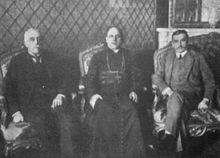Regency Council (Poland)

The Regency Council of the Kingdom of Poland (Polish: Rada Regencyjna, or Rada Regencyjna Królestwa Polskiego) was a semi-independent and temporarily appointed highest authority (head of state) in partitioned Poland during World War I. It was formed by Imperial Germany and Austria-Hungary within historically Polish lands around September 1917. The council was supposed to stay in office until the appointment of a new monarch or regent. On 7 October 1918, the Regency Council declared the independence of Poland.[1] That same month, the council took over the command of the Polska Siła Zbrojna armed forces.
History[]
The members of the Regency Council included: Cardinal Aleksander Kakowski, archbishop of Warsaw; Prince Zdzisław Lubomirski, president (mayor) of Warsaw; and landowner Józef Ostrowski, conservative politician, former chairman of the Polish Club in the Duma in St. Petersburg.
Together with the State Council and other branches of the government, the Regency Council exercised limited administrative powers, mainly in education and justice. On 7 October 1918, the council declared the independence of Poland from Germany.[1] On 14 November, it transferred all of its authority to Józef Piłsudski, who served from 22 November as temporary chief of state of the newly independent Polish state.[2]
Prime Ministers[]
- Jan Kucharzewski (November 26, 1917 – February 27, 1918)
- Antoni Ponikowski (February 27 – April 3, 1918)
- Jan Kanty Steczkowski (April 4 – October 23, 1918)
- Józef Świeżyński (October 23 – November 5, 1918)
- Władysław Wróblewski (November 5–11, 1918)
References[]
- ^ a b Rada Regencyjna (1918-10-07). "Message of the Regency Council to the Polish Nation" [Orędzie Rady Regencyjnej do Narodu Polskiego]. Prawo.Sejm.gov.pl (in Polish).
- ^ Rada Regencyjna (1918-11-14). "Orędzie Rady Regencyjnej w przedmiocie rozwiązania Rady Regencyjnej i przekazania Najwyższej Władzy Państwowej naczelnemu dowódcy wojsk polskich Józefowi Piłsuskiemu". Prawo.Sejm.gov.pl (in Polish). Rada Regencyjna Królestwa Polskiego.
Further reading[]
- Zdzisław Julian Winnicki, Rada Regencyjna Królestwa Polskiego i jej organy (1917 – 1918), Wrocław 2017 (in Polish)
- 1917 establishments in Poland
- 1918 disestablishments in Poland
- Poland in World War I
- Political history of Poland
- Kingdom of Poland (1917–1918)